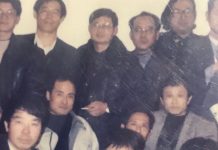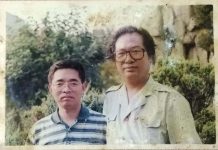作者:袁崛 (中国民主党党史法规部长)
编辑:刘芳 责任编辑:罗志飞 校对:程筱筱 翻译:刘芳
继中国民主党山东筹委会和海外后援会相继宣布成立后,组党进入第三波:中国民主党湖北筹委会要求注册,照山东办。(中国人权民运信息中心,北京十一日电)
中国民主党湖北省筹委会是由武汉异议人士秦永敏、陈忠和、吕新华、任秋光、萧诗昌、刘飞跃、高进勤等七人共同发起。十日上午陈忠和、吕新华、任秋光等三人到湖北省民政厅社团管理处申请注册成立中国民主党湖北筹委会。与民主党山东筹委会遭遇到的情形一样,民政厅接待官员要求他们在申请书上补充四项条件:一、必须要有人民币五万元注册资金;二、必须在申请书上列明“中国民主党办公场所”;三、必须列明主席、副主席、秘书长等重要职务人员的个人简历;四、必须列明中国民主党五十名成员名单。 由于中共当局一反传统对待反对派人士的方式,让外界既诧异又好奇:中共究竟是迫于形势真的想开放党禁?还是因应联合国人权高级专员罗宾逊女士的造访以及签署《公民权利与政治权利公约》而暂时摆出的姿态?
16期-rId5-400X400.jpeg)
“中国的曼德拉”、中国民主党人——秦永敏(累计刑期36年)
海内外对此看法不一。民运先驱王炳章发表《让策略灵活得使魔鬼迷惑——浙江、山东民运组党的感想之二》,赞扬浙江、山东的组党运动使国内公开层面的民运活动提升到一个新的高度、即筹组公开反对党的高度。指出勇气与谋略的同等重要性,“只有勇,没用谋,是政治上的冒险主义;只会谋,缺少勇,是政治上的保守主义。两种倾向都要避免。 策略是桥和船,是抵达彼岸不可或缺的工具”。相当肯定这次浙江和山东民运在策略上的操作,认为给后继者提供了不少借鉴。 (一九九八年九月十日)
纽约的中国民主党海外后援会发表声明,对中共试图解除党禁的进展表示欢迎。后援会呼吁海外民运团结一致,给予中国民主党最大的支持,以突破中共党禁。
台湾的民主进步党公开表示支持中国民运人士组党,共建民主中国。民进党资深顾问洪哲胜博士告诉记者,“台湾的民进党已经明确表示支持中国大陆民运人士的组党活动,该党表示密切注意事态进展,并呼吁中共顺应时代潮流,借鉴国民党的经验,早日推进民主制度的实现,造福两岸人民”。
与以上乐观其成的观点略有不同,部分党内外人士也对中共能否开放党禁,是否为新一轮的“阳谋”表示担忧。《湘江评论》主办人、现中国民主党全国联合总部主席郑存柱发表:“值得警惕的另一种可能”。文中指出“组党的‘成果’是在美国总统克林顿和联合国人权专员罗宾逊女士访华的特殊背景下取得的;中共自毛泽东开始有利用‘阳谋’引蛇出洞的传统;目前国内经济形势不容乐观,不排除中共转嫁危急于国内民主运动;台湾民主运动的经验表明,目前条件下执政党不会轻易开放 ‘党禁’。”
16期-rId6-1200X1600.jpeg)
98年组党先锋,中国民主党海外委员会主席陈忠和(已故)
工运人士申请成立独立工会,然后陕西工运人士赵常青被判刑三年,湖南工运人士张善光被判刑10年”,这一系列事件表明,不能对中共的一时容忍太过乐观。
王炳章发表:《审慎乐观,谨防引蛇出洞》,湖北秦永敏亦表示,“民政厅接受申请,并不意味中共就会同意民主党组党,所以对这件事仍不能过于乐观”。香港时事评论员刘锐绍表示,“现时看不出北京政府有信心在政治改革上作出大突破,认为北京仍无意政治改革”。台湾立法委员多持保留态度,民进党籍立委施明德(台南市) 表示,“中共拟准异议人士组党,有可能是‘假性多党’的阶段,台湾有很长的一段时间就是处在这种状态中,直到1970年末才有真正的反对党出现”。
The Third Wave of Party Formation in Hubei:
A Rational Perspective from Inside and Outside the Movement
Author: Yuan Jue (Minister of Party History and Regulations, China Democracy Party)
Editor: Liu Fang Executive Editor: Luo Zhifei Proofreader: Cheng Xiaoxiao Translator: Liu Fang
Abstract: The application by the Hubei Preparatory Committee of the China Democracy Party (CDP) for official registration has drawn public attention. While some observers question whether the Chinese Communist Party (CCP) truly intends to lift the ban on opposition parties, most in the pro-democracy movement express cautious optimism mixed with vigilance.
Following the establishment of the Shandong Preparatory Committee and the Overseas Support Committee of the China Democracy Party, a third wave of party formation has begun: the Hubei Preparatory Committee of the China Democracy Party has submitted a registration request—mirroring the Shandong case. (China Human Rights and Democracy Information Center, Beijing, July 11)
The Hubei Preparatory Committee was jointly initiated by seven dissidents in Wuhan: Qin Yongmin, Chen Zhonghe, Lü Xinhua, Ren Qiuguang, Xiao Shichang, Liu Feiyue, and Gao Jinqin. On the morning of the 10th, Chen Zhonghe, Lü Xinhua, and Ren Qiuguang went to the Hubei Provincial Department of Civil Affairs’ Social Organization Administration Office to apply for registration.
As in the case of Shandong’s committee, officials required them to meet four additional conditions:
RMB 50,000 in registered capital;
A listed physical office address for the China Democracy Party;
Submission of personal résumés for key positions such as chairman, vice-chairman, and secretary-general;
A list of 50 party members.
Because the CCP authorities departed from their usual practice of immediately suppressing opposition attempts, the move both surprised and intrigued outside observers: Is the CCP truly preparing to lift the party ban under external pressure, or is this merely a gesture timed for UN High Commissioner for Human Rights Mary Robinson’s visit and China’s signing of the International Covenant on Civil and Political Rights?
16期-rId5-400X400.jpeg)
“China’s Mandela” — Qin Yongmin, CDP Activist (Cumulative 36 Years Imprisoned)
Reactions have been mixed both inside and outside China.
Pro-democracy pioneer Wang Bingzhang published an essay titled “Make Strategy So Flexible It Confounds the Devil — Reflections on the Zhejiang and Shandong Party Formation Movements (II)” praising these initiatives for raising domestic activism to a new, openly organized level—the formation of a public opposition party.
He emphasized the equal importance of courage and strategy: “Courage without strategy is political adventurism; strategy without courage is political conservatism. Both must be avoided. Strategy is both bridge and boat—indispensable for reaching the far shore.”
Wang affirmed the tactical wisdom of the Zhejiang and Shandong activists, noting their efforts provide valuable lessons for those who follow. (September 10, 1998)
The CDP Overseas Support Committee in New York issued a statement welcoming what it viewed as progress toward lifting the party ban, calling for solidarity across the overseas democracy movement to support the China Democracy Party in breaking the CCP’s monopoly on political organization.
Taiwan’s Democratic Progressive Party (DPP) also expressed open support for Chinese democracy activists’ efforts to form a party. Senior DPP advisor Dr. Hung Che-sheng stated,“The DPP fully supports the attempts by mainland democracy activists to establish opposition parties. We are closely following developments and urge the CCP to follow the global democratic tide, learn from the Kuomintang’s experience, and advance democratic institutions for the benefit of people on both sides of the Strait.”
Voices of Caution: Is This a New “Conspiracy of Tolerance”?
Other voices, however, urge prudence. Some within and beyond the movement warn that the CCP’s apparent tolerance could be another calculated “yangmou” (open conspiracy).
Zheng Cunzhu, editor of Xiangjiang Review and current chairman of the China Democracy Party National Joint Headquarters, wrote an article titled “Another Possibility Worth Vigilance.” He argued:“The ‘achievement’ of registration occurred in the special context of U.S. President Bill Clinton’s and UN Commissioner Robinson’s visits to China. Since Mao, the CCP has a tradition of using ‘open conspiracies’ to lure opponents into the open. With the current poor economic situation, it is possible the regime seeks to divert internal crises toward the democracy movement. Taiwan’s own experience shows ruling parties rarely lift bans on opposition under such conditions.”
16期-rId6-1200X1600.jpeg)
1998 Party-Formation Pioneer: Chen Zhonghe, Late Chairman of the CDP Overseas Committee
Events soon confirmed these concerns. Following the attempt by labor activists to establish an independent trade union, Zhao Changqing in Shaanxi was sentenced to three years in prison, and Zhang Shanguang in Hunan received ten years. This sequence of cases demonstrated that one should not be overly optimistic about temporary leniency from the CCP.
Wang Bingzhang later published “Cautious Optimism—Beware of the CCP’s Bait”, and Qin Yongmin himself remarked, “The Civil Affairs Bureau’s acceptance of our application does not mean the CCP will approve the CDP’s registration. We should not be too optimistic.”
Hong Kong current affairs commentator Lau Yui-siu likewise noted, “There is no evidence the Beijing government has the confidence to make a breakthrough in political reform. It shows no real intention to democratize.”
Many legislators in Taiwan also voiced skepticism. DPP legislator Shih Ming-teh (Tainan City) commented, “The CCP’s reported tolerance of opposition parties may represent only a phase of ‘pseudo pluralism.’ Taiwan itself experienced a long period of such nominal multipartyism before genuine opposition emerged in the late 1970s.”









